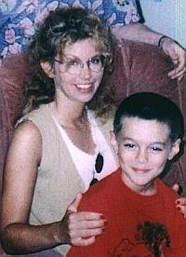On October 13, 1997, Julie Rea 10-year old son, Joel, was brutally stabbed to death in the middle of the night by an intruder. The crime shocked the small town of Lawrenceville, Illinois.

In June of 2000, Bill Clutter, a criminal defense investigator with capital experience was contacted by Indiana criminal defense attorney Katheryn Leil. The attorney explained that her client, Julie Rea, a Ph.D. student at the University of Indiana, was about to be indicted by a grand jury in Illinois for the murder of her 10-year-old son. She said that Julie had been the sole focus of a police investigation over a three-year period since the crime occurred despite the fact that Julie described in detail an intruder who randomly targeted her home and her child. Her son Joel was slain with a knife that had come from her kitchen. Awakened at 4 a.m. by Joel’s haunting scream, Julie survived a vicious attack by a man she encountered in Joel’s room. Startled by her entry, the murderer dropped the knife and fled.
Hearing Julie’s description of the assailant and the details of the crime for the first time, Clutter told Leil that Joel’s murder sounded like the work of a child serial killer who had recently been arrested for a similar crime in Texas. The description of the intruder, and the modis operandi, said Clutter, fit the description of a confessed child serial killer named Tommy Lynn Sells. On New Years Eve of 1999, Sells broke into the home of a Del Rio Texas family at 4:30 a.m. and brutally stabbed to death 13 year-old Kaylene Harris while the rest of the family slept through the attack. Another child, 10 year-old Krystal Surles had her throat slashed, but survived the attack and provided police with a description of the assailant, leading to the arrest of Sells, who is now serving a death sentence in Texas for that crime.
Clutter suggested that a defense investigation should look at Sells as a possible suspect in the murder of Joel Kirkpatrick.
Though there was no motive or evidence that she had killed her only child, Julie was indicted on Oct. 12, 2000 on capital murder charges by a special prosecutor who was appointed after the elected State’s Attorney declined to press charges, citing a lack of evidence.
Prosecutors Prevent Access to Reforms Designed to Protect Innocent People from Execution
On Oct. 12, 2000, Julie was charged with capital murder. Having exhausted her life savings on private counsel, Julie filed a pro se petition requesting the appointment of two capital-qualified attorneys to defend her, seeking the protection of Supreme Court reforms that were to take effect in March of 2001 which required two qualified attorneys to defend a person facing the death penalty.
Prosecutors prevented Julie from receiving the benefit of those reforms by announcing they no longer intended to seek the death penalty.
No longer facing the death penalty, Julie was not entitled to receive death penalty resources, like the Capital Litigation Trust Fund. The legislative intent was to provide funding for investigators in order to adequately investigate claims of actual innocence during pre-trial stages of a case. In theory, the Fund was designed to prevent an innocent person from being wrongfully convicted.
The legislature created the Capital Litigation Trust Fund (taking effect Jan. 1, 2000) after Anthony Porter, 48 hours away from execution, was exonerated by a private investigator Paul Ciolino, working with a Northwestern University journalism professor, Dave Protess.
The prosecutor’s decision to drop the death penalty blocked the appointment of Julie’s private counsel, Katherine Leil and private investigator Bill Clutter.
Lacking the resources to fully investigate her innocence, Julie was convicted in March of 2002.
Prosecutors Used Emotionally Charged Evidence in their Zeal to Convict
Prosecutors improperly elicited testimony from Julie’s ex-husband that she had once considered having an abortion when she became pregnant with Joel. Julie, raised in a deeply religious family, adamantly denied this. The case, tried in Wayne County, deep in Southern Illinois, was in a conservative rural county where abortion is fiercely opposed by an overwhelming majority. The prejudicial impact of this emotionally-charged testimony becomes even clearer when one looks at the 2004 election for the US Senate between Barack Obama and Alan Keys; two black candidates who had distinctly opposing positions on the abortion issue. Keys based his campaign entirely on his pro-life views on abortion. Though Obama won 70% of the vote statewide in an overwhelming landslide, Keys commanded 72% of the popular vote in Wayne County where Julie’s case was tried.
Defended by a lone, public defender and outmatched by three opposing prosecutors, Julie was convicted on March 4, 2002, and sentenced to serve 65 years in prison.
ABC Airs the Story
On May 31, 2002, just weeks after Julie was sentenced, ABC 20/20 aired her story. Diane Fanning, a true crime author on serial killer Tommy Lynn Sells, watched the program. She corresponded with Sells. Without providing him when this crime occurred, Sells wrote back and asked her if this murder happened two days before his Springfield, MO murder. On Oct. 15, two days after Joel’s murder, Sells abducted and killed 13 year-old Stephanie Mahaney. He was indicted for that murder by a grand jury after he gave details that only the killer would know.
A year later, author Diane Fanning’s book Through the Window was released. She detailed Sells’ confession to the murder for which Julie Rea was convicted. Bill Clutter, then Director of Investigations for the Project, led the investigation to corroborate Sells’ confession.
Downstate Illinois Innocence Project Corroborates Sells’ Confession:
Investigation by the Project resulted in eyewitness testimony from Alan Berkshire who saw Sells in Lawrenceville the weekend Joel was killed; and the testimony of Sandra Wirth, who reported selling a bus ticket in Winnemucca, Nevada two days after Joel was killed to a man who matched the suspect Julie described to police. Winnemucca is significant because Texas Rangers could place Sells there after Joel was killed. Texas Ranger John Allen reviewed the evidence gathered by UIS. This evidence convinced Ranger Allen that Sells’ confession to the murder of Joel Kirkpatrick was genuine.
UIS Presents Exonerating Evidence to the Prisoner Review Board
On Oct. 24, 2003, the Downstate Illinois Innocence Project presented compelling evidence corroborating the confession of Tommy Lynn Sells.
Diane Fanning testified as to the circumstances of how Sells confessed to the murder of Joel Kirkpatrick. Former state police crime scene investigator Alva Busch pointed out inaccuracies in the interpretation of crime scene evidence of one of the State’s experts at the first trial that contributed to Julie’s wrongful conviction.
Bill Clutter, Director of Investigations for the Downstate Illinois Innocence Project, presented a summary of the evidence corroborating Sells’ confession.
At the urging of the Prisoner Review Board, prosecutor David Rands and Sgt. Pea of the Illinois State Police traveled to Texas on Nov. 6, 2003 and conducted an audio- recorded interview of Sells. Sells gave details that only the killer would know. Sells told prosecutors that during the struggle the woman clung to his leg as he drug her inside the house. Six years earlier, Julie had described grabbing the intruder’s leg and of being dragged on the carpet. A nurse who treated Julie observed what appeared to be rug burns on her leg.
Despite 53 points of corroboration to Sells’ confession to the murder of Joel Kirkpatrick, prosecutors continued to insist they disbelieved the confession based on the few facts Sells got wrong, taking the same position prosecutors in DuPage County took in the Nicarico case when they were presented with the confession of serial killer Brian Dugan in 1985.
UIS Discovers Evidence of Police Perjury
The media coverage from the Prisoner Review Board hearing prompted the former mayor of Lawrenceville and the former chief of police to contact the Downstate Innocence Project with evidence suggesting that a Lawrence County Sheriff deputy testified falsely at Julie’s first trial, providing false evidence which contributed to her conviction. The Deputy, who was first on the scene, made no report about searching the back yard for footprints on an intruder. However, at trial, Deputy Dennis York testified that before entering the house he shined his flash light down on the wet dew-covered grass and could find no evidence of a perpetrator’s footprints in the back yard where Julie described the intruder striking her to the ground and calmly walking away. York testified, “I shined the yard with my light. It was heavy dew. I seen no fresh track in the yard.” However, this testimony is contradicted by a neighbor who walked the same area in his barefeet and said the grass was dry. After Julie was convicted, her new husband Mark Harper contacted a meteorologist who reviewed weather records for that morning. This expert concluded there would have been no dew on the ground that morning. Key evidence was discovered by UIS that was never provided to Julie’s defense attorney by prosecutors. This withheld evidence was an audio-taped interview of Deputy York that was conducted on the morning of the crime by the Lawrenceville police chief David White. The audio interview contradicted York’s trial testimony by stating he went immediately inside the house and never mentioned searching the back yard for footprints in the dew. This audio tape was never provided to the defense during Julie’s first trial. Yet, his testimony was used by prosecutors as evidence that there was no intruder.

Appellate Court Vacates Conviction.
On June 24, 2004, the appellate court vacated Julie’s conviction and ordered her immediate release. As she was set to take her first step out of prison, prosecutors re-arrested Julie, ignoring overwhelming evidence that she was innocent. Supporters quickly rallied and raised $75,000 in less than a week’s time to secure her release on bond. Instead of seeking justice as new Supreme Court rules require, prosecutors sought to convict her again.
Jury Acquits Julie
On July 26, 2006, a jury in Carlyle found Julie not guilty of killing her son.
Julie was represented by the Bluhm Legal Clinic at Northwestern University Law School. Lead attorney Ron Safer, a former federal prosecutor and partner at the Chicago law firm of Schiff Hardin LLP, donated his time to Julie’s legal defense. He was assisted by Jeff Urdangen, a staff attorney at Northwestern.
Other staff attorneys Karen Daniel, Judith Royal and law students at Northwestern University assisted the defense team.
Illinois Times Articles
Who Killed Joel? His mother is currently serving a 65-year sentence for his murder. Why, then, has a Texas serial killer confessed to the crime?
By Dusty Rhodes July 24, 2003
A Twisted Tale: New evidence may link serial killer Tommy Lynn Sells to the murder of a 10-year-old Illinois boy
By Dusty Rhodes JULY 15, 2004
Never Say Die
By Dusty Rhodes JULY 15, 2004
Prosecution Proceeds
By Dusty Rhodes OCTOBER 7, 2004
The Prosecution Complex
By Larry Golden MAY 19, 2005
The end: For nine long years, Julie Rea Harper insisted someone else murdered her son. Last month, she got 12 jurors to believe her
By Dusty Rhodes AUGUST 10, 2006
You’re screwed: Power of prosecutors grows as defense resources wither
By Dusty Rhodes AUGUST 17, 2006